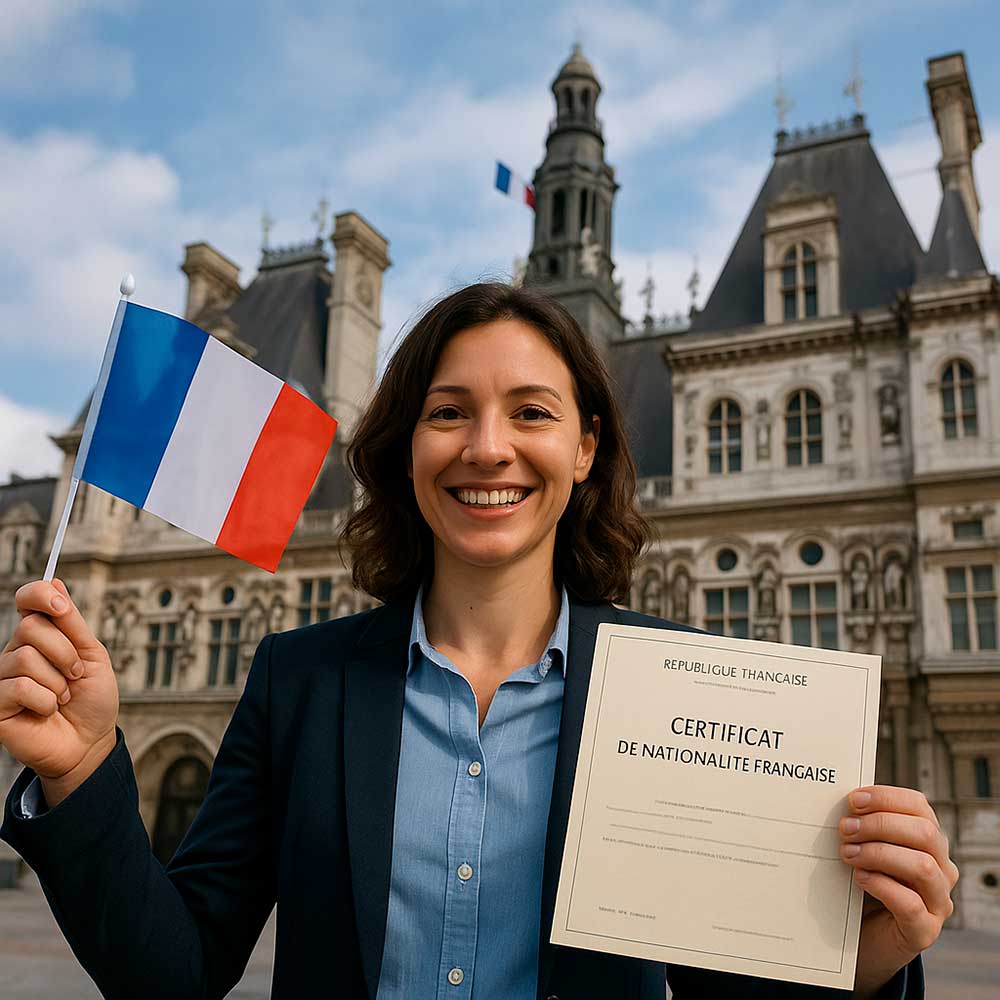French citizenship is a stable legal connection between a person and the French state, which implies the whole complex of mutual rights and obligations. Obtaining the status of a French citizen opens up huge opportunities: you become a citizen of the European Union, receive a French passport and all the associated privileges. French citizenship is especially attractive for immigrants seeking permanent life in Europe: France is a stable developed country with a high quality of life and social guarantees for its citizens. People move to this country for quality education, advanced medicine and career prospects. The holder of a French passport is equalized in rights with the native population and can fully enjoy all the benefits of the state.
However, the process of naturalization in France requires time and compliance with a number of conditions. In this article we will explain step by step how to obtain French citizenship in 2026 on various grounds. You will learn who is eligible to apply, what requirements are imposed on applicants, how long it takes to formalize the status and what costs await the applicant. We will also look at the benefits of French citizenship and the possibility of dual citizenship with France. The article will help you understand the nuances of the legislation and plan your actions if you decide to become a citizen of this country.
Advice from experts: if your goal is a European passport, start by analyzing your own grounds and consulting with an immigration lawyer. In 2026, EU citizenship can be obtained through simplified programs. Mycitizenagency specialist will help you assess your chances and choose the best path to an EU passport.
Find out details about applying for a French passport at a free consultation
To consult with a Mycitizenagency specialist, leave a request in the short form below
Advantages of French citizenship
- Freedom of residence and employment in the EU.
France is a member of the European Union and every French citizen automatically becomes an EU citizen. A French passport gives its holder unlimited rights of residence, access to education and employment benefits throughout the European Union – without the need to obtain additional authorizations. Simply put, with a French passport you can live and work in any EU country (as well as in the EEA and Switzerland) on an equal footing with locals. A French citizen also enjoys full social support from the French state and can participate in French elections. - Visa-free travel around the world.
The French passport is considered one of the most powerful passports in the world. It allows visa-free travel to virtually the entire world – as of 2026, French citizens have free entry or visa on arrival to 192 countries and territories, ranking 2nd globally in freedom of movement. In comparison, French passport holders can travel visa-free to about 128 countries, with about 40 other countries issuing a visa on arrival and 9 countries requiring only electronic authorization (eVisa). Thus, French citizenship eliminates visa barriers for travel and business trips. - Status for the whole family.
The benefits of citizenship extend to your loved ones. First, children of French citizens automatically acquire French nationality by blood right (if at least one parent is French). A spouse of foreign origin can naturalize under a simplified procedure. Parents, brothers and sisters can also apply for simplified citizenship by declaration of kinship. In addition, citizenship status is passed on to descendants by inheritance. By obtaining a French passport, you will ensure your children and grandchildren the right to live and work in Europe without restrictions. - Social benefits and quality of life.
French citizenship gives access to a developed system of social protection. The state provides unemployment assistance, subsidized housing, utilities, support for families with children and other benefits for its citizens. France has a high life expectancy, one of the best environmental levels in the world, and cities are adapted for comfortable living. Citizens can receive world-class education and medical services on favorable terms, and use developed infrastructure. France is Europe’s second economy, which means a rich labor market and business opportunities. With a citizen’s passport, you can freely open accounts in European banks, invest in real estate and businesses, receive loans and benefits on a common basis. - Retention of the first citizenship.
Dual citizenship is officially allowed in France. A foreigner is not required to renounce his former nationality upon naturalization, unless required by the laws of his country of origin. Although France has agreements with only a few countries (e.g., Spain) on dual citizenship in the strict legal sense, in fact the country allows holding more than one passport.
Taken together, French citizenship opens up a world of opportunities for you. It is not without reason that the reviews of immigrants who have already obtained a French passport emphasize that all the efforts and time spent are fully repaid by the rights and freedom acquired.
Important: Remember that obtaining French citizenship requires fulfillment of strict conditions and a long waiting period. If you need to obtain a second EU citizenship faster, consider alternative programs. Some EU countries offer more favorable ways: for example, in Slovenia you can get a passport in 4-12 months without language exams. You can also apply for citizenship of another EU country first with a simple procedure, move to France as a Union citizen, and then apply for a French passport five years later. This approach will get rid of visa ba,0ries and facilitate integration.
Ways of obtaining French citizenship
French law provides for several main ways of acquiring citizenship. Let us list all the grounds on which a foreigner may become a French citizen:
- Naturalization (by residence). The standard route for most immigrants. It requires residence in France for at least 5 years and fulfillment of a number of conditions (more on them below). You can then apply for citizenship by naturalization (par décret). This is the most common way to become French for those who do not have French relatives.
- Descent (repatriation by roots). If the applicant has French national roots or close relatives with French citizenship, citizenship by descent is possible. Direct jus sanguinis (right of blood) states: a child automatically becomes a French citizen if at least one of the parents is a French citizen. In addition, the law allows simplified citizenship by declaration for other French relatives. For example, a foreign son or daughter, father or mother, or grandparent of a French citizen may submit a declaration for French nationality if the conditions for residence and integration are met.
- French citizenship by marriage. A foreigner who is officially married to a French citizen/citizen is entitled to simplified naturalization through a declaration of marriage. French citizenship is not automatically granted upon marriage, but living together with a French spouse shortens the timeframe considerably. You can apply 4 years after the wedding, if the couple has lived in France all this time. If the spouses live outside France, the period increases to 5 years. An important condition – the marriage must be officially registered and not dissolved, the French spouse gives notarized consent to the naturalization of the partner. The applicant will need to prove knowledge of French (at least level B1) and integration into society, as well as cohabitation with the spouse. Citizenship by marriage is a popular option for those who have started a family with a French citizen.
- By birth in France (right of soil). Unlike some countries in the Americas, in France, birth in France does not automatically guarantee a child citizenship if the parents are foreigners. France adheres to jus sanguinis (right of blood), so the child follows the citizenship of the parents. Nevertheless, the law allows the children of foreigners born in France to acquire French citizenship if the conditions of permanent residence are met: as a rule, if the child was born in France and has lived here for at least 5 years, he or she can claim citizenship at the age of 18. Simply put, such children remain foreigners until adulthood, but can become citizens if they actually grew up in France.
- Adoption. Separately, it is worth mentioning that a foreign child adopted by French citizens can obtain French citizenship. Full adoption leads to the fact that the child breaks the link with the biological family and is considered to be born to new French parents. Under this condition, the adopted minor automatically becomes a citizen.
- Citizenship for investment. Many people wonder whether it is possible to buy French citizenship with money. France does not have citizenship programs for investment – that is, it is impossible to obtain a passport directly for contribution to the economy. Investors can immigrate to the country through residence permit for investment (French Tech Visa program) and then after 5 years apply for citizenship on general grounds. The essence of the program: when investing from 300 000 € in French business and creating at least 50 jobs, the investor receives a special long-term residence permit – “talent passport” category Economic Investor. This status is issued for 4 years and is extended if the project is successful. However, the final obtainment of a French passport still takes place through standard naturalization by residence (at least 5 years), with a language test and other conditions met.
- Special services to France. The law allows for exceptional cases in which citizenship may be granted by decree immediately, without respecting the period of residence. For example, a foreigner who has performed outstanding actions for the benefit of France (in science, culture, sports, public service) may be granted citizenship for special merits. Such cases may include, for example, the participation of a foreign athlete in the national team with victories for France. There is also the concept of Français par le sang versé – foreigners serving in the French Foreign Legion who are wounded in combat can apply for citizenship immediately, “on the basis of blood shed for France”. In general, however, such cases are rare and very individual.
As you can see, there are several options, ranging from standard naturalization to birth or marriage. Adult foreigners most often follow the path of marriage or long-term residence. Below we will take a closer look at the citizenship procedure and key requirements for applicants under the most common scenarios.

Procedure for obtaining French citizenship
If you fit into one of the categories (for example, you have lived in France for 5 years or are married to a Frenchman), you can proceed to the citizenship process. The procedure is strictly regulated by the law on French citizenship and includes several stages. Let us consider them one by one:
- Obtaining a residence permit and living in the country.
The first step for anyone planning to naturalize is to settle legally in France. Usually, a foreigner needs to arrive on a long-term visa and apply for a residence permit (PNG) on one of the grounds: study, work, business, family, financially independent status, etc. The first step is to legally settle in France. Without residency status it is not possible to start the countdown of the period of residency. The exception – EU citizens who can live in France without a visa and residence permit, they only need to register at the place of residence. It is important to reside permanently: for naturalization it is required to stay in France at least 183 days per year (more than half of the year) for all 5 years, otherwise the stay will not be counted as continuous. If the applicant leaves the country for more than 6 months a year, the five-year period of residence is reset. - Compliance with the required period of residence.
The standard period of residence is 5 years of continuous legal residence in France with a valid residence permit. For those who obtain citizenship by marriage, this period is shorter (4 years of joint married life in France). The law also provides for a reduction of the term in some cases: up to 2 years for graduates of French universities or persons with outstanding achievements, and to 0 years (i.e., without the requirement of residence) for certain categories – refugees, military personnel, French-speaking foreigners from former colonies, etc.). But for the vast majority of applicants, it is the threshold of 5 years that is relevant. The countdown is from the date of receipt of the first long-term residence permit (or registration of marriage with a Frenchman, if you are applying by marriage). It is important to note that at the time of application you must have a valid French residence permit or permanent residence permit. Until the required length of residence, it is pointless to apply for citizenship – the application will simply be rejected. - Document preparation.
An extensive package of documents is collected to apply for citizenship. The exact list may vary depending on the basis, but usually includes: a copy of the passport, birth certificate of the applicant or other documents confirming the basis (e.g., birth certificate of the French parent for filing by descent). Documents on current status in France – copy of residence permit or residence card, proof of residence address (rental agreement, utility receipts), proof of income (tax returns, job or bank statements) are required. Criminal record certificates from all countries where you have lived for the last 10 years (including France) will also be required. All documents not originally in French must be translated by a sworn translator and certified (apostille for foreign certificates). In addition, you must purchase a special fiscal stamp (timbre fiscal) with a nominal value of 55 € in advance – this is the state fee for processing the application. The stamp can be purchased online on the website of the tax office. Preparation of documents is a crucial stage: mistakes or missing papers may result in refusal of the application. - Submission of the application and interview.
The completed dossier is submitted to the prefecture in the place of residence. From 2023-2024, in many regions the submission of documents is now online: scans must be uploaded via the prefecture’s regional online platform. You can check the website of the French Ministry of the Interior or the prefecture of your department for up-to-date information on how to apply. In some prefectures, after the online application, a face-to-face appointment is scheduled for the submission of the originals and an interview. At the interview, a prefecture official checks the original documents and asks you questions related to the application. The purpose of the interview is to verify your identity, clarify your biographical information, and most importantly, to check your assimilation into French society. You may be asked about your motives for citizenship, your life in France, your knowledge of French history, culture, law and order, and your conversational French language skills may be assessed. If you applied by marriage, you will be asked about your life with your spouse. The interview usually takes place in French without an interpreter and lasts up to 30-60 minutes. Afterwards, the file is submitted to the Ministry of the Interior for review. - Waiting for a decision.
The applicant’s file is sent to the central authority, the Ministry of the Interior (DPI), after being checked at the prefecture. The DPI conducts an in-depth check of all the information provided: criminal record, tax discipline, financial solvency, integration. Archives are also checked to see if the applicant has any facts that pose a threat to public order (e.g., past deportations). Waiting for a response is the longest stage. On average, the Ministry considers an application from 18 months to 2 years. In practice, some people receive a response after a year, while others have to wait longer than two years (especially if the number of applications is high). You can track the status of the review through the online system by your case number. If the decision is positive, a naturalization decree is issued, which is the document by which the state grants you citizenship. - Assignment of citizenship and issuance of a passport.
If the decision is in your favor, the prefecture invites you to complete the formalities. The new citizen takes the oath of allegiance to the French Republic and signs the Charter of Rights and Duties of Citizenship. This ceremony usually takes place at the prefecture or town hall: you are congratulated and presented with a certificate of naturalization (Certificat de nationalité). From the moment the decree is signed, you officially become a French citizen. You can then apply for a passport and an internal ID card. A French passport is produced in a few weeks; the state fee for issuing a passport is about 86 € (in the métropole) or 96 € if you apply abroad. Once you have received your passport, the process is successfully completed – you are a full-fledged French citizen with all your documents.
Thus, even in the best case, the whole procedure – from the beginning of residence to the issuance of a passport – takes at least 6-7 years (5 years of residence permit + ~1-2 years of application processing). If applied by marriage, the period is reduced to ~5-6 years (4 years of marriage + ~1-2 years of consideration). The process requires patience and careful preparation, but the result will be a coveted French passport.
Check your chances of getting an EU passport through a simplified procedure
Sign up for a free consultation to learn more from the experts at Mycitizenagency as soon as possible
Requirements for applicants
To naturalize in France, a single period of residence is not enough – you need to meet a number of criteria. Let us consider the main requirements for applicants for French citizenship:
- Age and legal capacity. You can apply from the age of 18. Minor children are usually granted citizenship together with their parent. If the main applicant is a child, he or she must wait until the age of majority or special circumstances. In addition, the applicant must be legally capable (sane).
- Legality of Residence. You must have a valid residency status at the time of filing and deciding the case. In other words, you must live in France legally, with an up-to-date residence permit (except for EU citizens) and not violate immigration rules. Long-term status is a prerequisite, without it citizenship will not be granted. Also, the applicant must not have a valid expulsion order or ban on entry to France.
- Duration of residency. As noted, 5 years of continuous residence (or other period if reduced by law) is required. And residence means that France has become the center of your life interests – your job, family, real estate, etc. are here. If it turns out that during these years you actually lived outside of France (for example, your family and work remained in your home country), your citizenship will be denied.
- Financial autonomy (income). An important integration criterion is the ability to support oneself in France. The candidate must have a stable income or assets sufficient for his/her family to live without applying for benefits. There is no clear threshold, but the SMIC minimum wage (for 2021 ~€18,655 per year gross) is a benchmark. It is usually required to show an income of at least SMIC for the last few years. Wages, business profits, passive income – all sources confirmed by tax returns – are taken into account. If you have officially worked in France for all 5 years, this is ideal. Unemployed applicants will be more difficult – you will have to convince the authorities that you have independent means (for example, savings, rent) and you will not become a burden for social services. Having your own or rented accommodation also plays a role: the prefectures require you to prove that you have enough space for your family (at least 16 m² for two people + 9 m² for each additional family member). A rental contract or ownership certificate and utility receipts must be submitted.
- Knowledge of French. This is one of the key conditions. It is necessary to speak French at a level not lower than B1 on the Common European Framework of Reference (CERF). The B1 level implies the ability to explain yourself on everyday topics, to understand the interlocutor, to write simple texts. To prove this, you must pass a language test (e.g., TCF, TEF, DELF) and attach a B1 or higher certificate. Your speaking and comprehension skills will also be tested at the interview. Those who have graduated from a French-speaking institution or are over 60-70 years old are allowed to apply without a certificate (they often only need to demonstrate their speaking skills at the interview). But in general, the language integration requirement is strict: without knowledge of French, citizenship will not be granted. Applicants have to learn the language and pass exams.
- Integration and cultural knowledge. In addition to language, general assimilation into the community is checked. The applicant must share the basic principles and values of the Republic (liberty, equality, fraternity) and have an understanding of French history and culture. As part of the procedure, all candidates take a test of knowledge of French society – questions on history, the structure of the state, and civic duties. These examinations are conducted in the form of interviews or tests. Special brochures “Livret du citoyen” are issued for preparation. The aim is to make sure that the new citizen understands the state he or she is becoming a part of and shares its national values. If the applicant has not shown sufficient integration (e.g., all family and professional ties have remained abroad, no knowledge of the realities of French life), this can be a reason for refusal.
- Impeccable reputation (no criminal record). The candidate must be of good moral character (bonne vie et moeurs). You must have no criminal record for serious offenses and no record of acts contrary to public order. During the vetting phase, the Ministry of the Interior asks for your criminal record in France and certificates of no criminal record from other countries in the last 10 years. Small offenses (traffic fines, for example) usually do not interfere, but a criminal record with a sentence of more than 6 months in prison is guaranteed to lead to refusal. Compliance with the law is also checked: payment of taxes, absence of serious debts, sham marriages, etc. If you lied in the application form or falsified documents – this is also a violation, threatening refusal and sanctions. In general, the applicant must prove his or her trustworthiness and loyalty.
To summarize, the requirements for those wishing to obtain French citizenship are as follows: to live legally in France for the necessary period of time, to be financially independent, to speak French and know the basics of culture, to have a clean criminal record and to demonstrate a real connection with the country (work, family, payment of taxes). If all these conditions are met, the chances of a positive decision are very high.
Find out how to obtain citizenship faster
Terms and cost
Let’s estimate how long to wait for French citizenship and how much this procedure costs.
Receipt deadlines
The standard period of residence before filing is 5 years. Additionally, application processing takes on average 1.5-2 years. Thus, the general path of naturalization for a typical immigrant is about 6-7 years from the moment of moving to France. In some cases, the period may be shorter: for marriage you can apply after 4-5 years of marriage; for repatriation by French ancestry sometimes it is not necessary to wait for 5 years of stay, it is enough to prove the fact of kinship (but practice shows that without any period of residence in France to obtain citizenship even by descent is difficult).
If you fall under a preferential category (for example, a refugee or a graduate of a French university), your period of residence before filing is reduced to 2 years or canceled altogether. But even in these cases, the review process (checks, interview, decree) will still take up to two years. Be aware of possible delays: if the dossier is incomplete or complex, the procedure may be delayed. There are cases when the decision is not made even after 3 years – then the applicant has the right to send an inquiry about the status of the case or resubmit the documents. In general, waiting for citizenship is a test of patience.
Cost
The good news is that applying for citizenship in France is inexpensive. The state fee for the application is only 55 € (fiscal stamp). This amount is the same for all types of obtaining (by naturalization, marriage, etc.) and is paid once at the time of submission. If you are rejected as a result, the fee is not refundable. Once approved, you pay for the production of the documents: a French passport costs about 86 € (a normal 10-year passport for an adult inside France), and a national identification card (carte d’identité) costs about 25 € – although it is not compulsory to obtain one.
Additional costs may include: services of translators and notaries (certification of papers, apostilization of foreign documents), medical insurance, language courses and exam (TCF/TEF test is paid, about 150-200 €), postage. If you involve legal support or intermediaries, then, of course, you need to take into account their fees. But at the level of official payments the price of French citizenship is very symbolic – no “contribution” to the budget (as, for example, in some countries), only a small fee and the cost of the passport. France in principle does not sell its citizenship, so direct investment is not required.
The main costs on the way to citizenship are time and effort. You will have to live in the status of a foreigner for several years, renew your residence permit (each renewal costs from 19 to 269 € depending on the category), fulfill the requirements (for example, spend time and money to learn the language, integration). You should also take into account that taxes in France are quite high (maximum personal income tax rate of 45% on large incomes) – as a tax resident you will pay them. But when the goal is a French passport, these investments are justified by the long-term benefits. In the end, French citizenship is more an investment of your time and effort than money.

How to get dual citizenship in France
A separate frequent question is does France allow dual citizenship. The answer is yes. France allows multiple citizenship and is loyal to the fact that its citizens hold passports of other countries. During naturalization, you will not be asked to renounce your previous citizenship (except if your native country requires a withdrawal when acquiring foreign nationality). French law has no provision for automatically losing French citizenship upon obtaining another, so many French people hold two or more passports.
In general, dual (multiple) citizenship is a common phenomenon for immigrants in France. Many naturalized French people continue to have strong ties to their historical homeland, and legislation allows them to retain this status. So, by acquiring French citizenship, in most cases you do not lose anything, but only acquire a second passport and expand your opportunities.
Obtaining French citizenship is a complicated, multi-step, but quite realizable process. This article presented a complete instruction on how a foreigner can obtain a French passport. We have considered the ways (naturalization, marriage, descent, birth), described the order of registration step by step, listed the main requirements and deadlines. Now you have a holistic understanding of what to expect on the way to a French passport. Of course, each case is different – somewhere additional documents may be required or special rules apply (for example, for citizens of certain countries). Therefore, if you are serious about going down this path, we recommend that you seek professional help in obtaining French citizenship. A consultation with a specialized lawyer of Mycitizenagency will help to identify the weak points of your application, to draw up the paperwork correctly and avoid embarrassing mistakes.
French citizenship gives its holder the status of an EU citizen with all the advantages – from freedom of travel to social guarantees. It is an investment in the future of your family and new horizons in one of the leading countries of the world. With proper perseverance and compliance with all regulations, you can hold the coveted French passport in your hands in a few years. Start small: assess your grounds for immigration, improve your language skills, understand the requirements. And then act! Perhaps now is the right time to take a step towards your French dream.
Frequently Asked Questions about French Citizenship
We have compiled answers to the most common questions about obtaining French citizenship. If you did not find the information you were looking for or want to learn more about the requirements, timelines, and benefits of a French passport, contact us for a free consultation.

Yes, they can. Even if you have no income, you are expected to file an annual tax return as a French resident. This demonstrates your integration and respect for the law. Lack of tax history may be perceived as a lack of communication with the State and may be a reason for refusal.
Yes, in certain cases. For example, if applying by marriage to a French citizen or by descent, you can apply through a consulate. However, most naturalization applicants must apply in person in France and reside there at the time of application and processing.
Your citizenship remains with you – France does not revoke citizenship for moving out. But if you have not exercised your rights as a citizen (e.g., you have not filed a declaration, you have not voted) and the state finds out that the citizenship was obtained fraudulently or fictitiously, it can be revoked within 2 years from the date of obtaining it.
Yes, but only partially. If you studied under a student residence permit, these years do not count towards the standard five-year naturalization period. However, once you graduate and get a job, you can apply for a shorter period – only 2 years instead of 5 if you have a French higher education degree.
Yes, but only in extreme cases. For example, if citizenship was obtained by fraud (fake marriage, forged documents) or if the citizen has committed a particularly serious crime against the interests of the state (e.g., terrorism). Usually, such deprivation is possible within 10 years after obtaining citizenship and is rarely applied.
France does not grant automatic birthright citizenship (jus soli) like the U.S. A child born in France to foreign parents does not become a French citizen at birth. However, they may acquire citizenship later, usually at age 18, if they have lived in France for at least 5 years since age 11. Children born in France to at least one parent who was also born in France generally acquire citizenship automatically.
Yes. France allows dual (and even multiple) citizenship. French law does not require a person to renounce their original nationality when acquiring French nationality, nor does it require a French citizen to give up their French passport if they naturalize elsewhere. This means you can legally hold French citizenship together with another (or several) nationalities, provided the other country’s laws also permit it.




